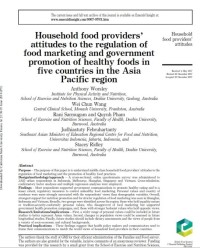Household food providers’ attitudes to the regulation of food marketing and government promotion of healthy foods in five countries in the Asia Pacific region

Author
Judhiastuty Februhartanty - Personal NameAnthony Worsley - Personal Name
Wei Chun Wan - Personal Name
Rani Sarmugam - Personal Name
Quynh Pham - Personal Name
Stacey Ridley - Personal Name
Abstract:
Purpose: The purpose of this paper is to understand middle class household food providers’ attitudes to the regulation of food marketing and the promotion of healthy food practices. Design/methodology/approach A cross-sectional, online questionnaire survey was administered to 3,925 urban respondents in Indonesia, Melbourne, Shanghai, Singapore and Vietnam. Cross-tabulation, confirmatory factor analyses and multiple regression analyses were employed.
Findings: Most respondents supported government communications to promote healthy eating and to a lesser extent, regulatory measures to control unhealthy food marketing. Personal values and country of residence were more strongly associated with the respondents’ views than demographic variables. Overall, strongest support for nutrition promotion and for stricter regulation of food marketing was seen in Shanghai, Indonesia and Vietnam. Broadly, two groups were identified across the region: those who held equality-nature or tradition-security-conformity personal values, who disapproved of food marketing but supported government health promotion campaigns, and, those with stronger hedonist values who held opposite views.
Research limitations/implications: First, a wider range of personal values could be included in future studies to better represent Asian values. Second, changes in population views could be assessed in future longitudinal studies. Finally, future studies should include dietary assessments and the views of people from a variety of socio-economic and cultural backgrounds.
Practical implications: These findings suggest that health policy makers and communicators need to frame their communications to match the world views of household food providers in their countries.
Originality/value The study provides confirmation of attitude-values theories within five different countries in the Asia Pacific region and demonstrates the importance of personal values and country of residence in influencing food providers’ views.
Detail Information
| Series Title | : | - |
| Call Number | : | - |
| Publisher | : | : ., 2018 |
| Collation | : | British Food Journal, Vol. 120 No. 6, pp. 1236-1249 |
| Language | : | English |
| ISBN/ISSN | : | - |
| Classification | : | NONE |
 Computer Science, Information & General Works
Computer Science, Information & General Works  Philosophy & Psychology
Philosophy & Psychology  Religion
Religion  Social Sciences
Social Sciences  Language
Language  Pure Science
Pure Science  Applied Sciences
Applied Sciences  Art & Recreation
Art & Recreation  Literature
Literature  History & Geography
History & Geography